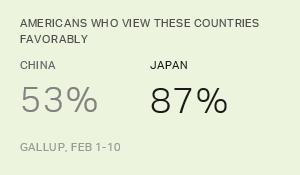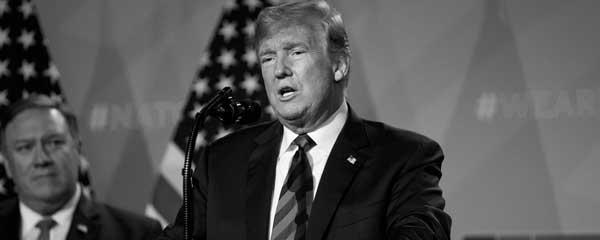Story Highlights
- 17% say tariffs have hurt their family; 6% helped
- More say they have hurt (38%) than helped (16%) U.S. economy
- Republicans more likely than Democrats to expect tariffs to help economy
WASHINGTON, D.C. -- Most Americans say that the new tariffs the U.S. and China are imposing on each other's goods have not affected their family's financial situation to date, but more of those who have seen an impact say the tariffs have hurt rather than helped. Americans are much more likely to believe the tariffs have affected the economy, but again twice as many say they have hurt the economy rather than helped it.
| Helped | No effect | Hurt | No opinion | ||||||||||||||||||||||||||||||||||||||||||||||||||||||||||||||||||||||||||||||||||||||||||||||||
|---|---|---|---|---|---|---|---|---|---|---|---|---|---|---|---|---|---|---|---|---|---|---|---|---|---|---|---|---|---|---|---|---|---|---|---|---|---|---|---|---|---|---|---|---|---|---|---|---|---|---|---|---|---|---|---|---|---|---|---|---|---|---|---|---|---|---|---|---|---|---|---|---|---|---|---|---|---|---|---|---|---|---|---|---|---|---|---|---|---|---|---|---|---|---|---|---|---|---|---|
| % | % | % | % | ||||||||||||||||||||||||||||||||||||||||||||||||||||||||||||||||||||||||||||||||||||||||||||||||
| The U.S. economy | 16 | 36 | 38 | 11 | |||||||||||||||||||||||||||||||||||||||||||||||||||||||||||||||||||||||||||||||||||||||||||||||
| Your employer's financial situation^ | 8 | 67 | 17 | 8 | |||||||||||||||||||||||||||||||||||||||||||||||||||||||||||||||||||||||||||||||||||||||||||||||
| Your family's financial situation | 6 | 72 | 17 | 5 | |||||||||||||||||||||||||||||||||||||||||||||||||||||||||||||||||||||||||||||||||||||||||||||||
| ^Based on employed adults | |||||||||||||||||||||||||||||||||||||||||||||||||||||||||||||||||||||||||||||||||||||||||||||||||||
| ║┌┴¤═°, July 16-22, 2018 | |||||||||||||||||||||||||||||||||||||||||||||||||||||||||||||||||||||||||||||||||||||||||||||||||||
Americans are more likely to perceive a positive or negative impact of the tariff situation in the long run. But, as is the case with views of the current impact, Americans predict the tariffs will be more harmful than beneficial.
Nearly half, 45%, expect the tariffs to make the U.S. economy worse in the long run, while 31% think they will make it better -- and just 19% think they won't make a difference. By 33% to 20%, Americans predict the tariffs will make their family's financial situation worse rather than better. Working Americans express similar views about the impact on their employer.
| Better | Not much difference | Worse | No opinion | ||||||||||||||||||||||||||||||||||||||||||||||||||||||||||||||||||||||||||||||||||||||||||||||||
|---|---|---|---|---|---|---|---|---|---|---|---|---|---|---|---|---|---|---|---|---|---|---|---|---|---|---|---|---|---|---|---|---|---|---|---|---|---|---|---|---|---|---|---|---|---|---|---|---|---|---|---|---|---|---|---|---|---|---|---|---|---|---|---|---|---|---|---|---|---|---|---|---|---|---|---|---|---|---|---|---|---|---|---|---|---|---|---|---|---|---|---|---|---|---|---|---|---|---|---|
| % | % | % | % | ||||||||||||||||||||||||||||||||||||||||||||||||||||||||||||||||||||||||||||||||||||||||||||||||
| The U.S. economy | 31 | 19 | 45 | 5 | |||||||||||||||||||||||||||||||||||||||||||||||||||||||||||||||||||||||||||||||||||||||||||||||
| Your employer's financial situation^ | 18 | 46 | 29 | 6 | |||||||||||||||||||||||||||||||||||||||||||||||||||||||||||||||||||||||||||||||||||||||||||||||
| Your family's financial situation | 20 | 43 | 33 | 4 | |||||||||||||||||||||||||||||||||||||||||||||||||||||||||||||||||||||||||||||||||||||||||||||||
| ^Based on employed adults | |||||||||||||||||||||||||||||||||||||||||||||||||||||||||||||||||||||||||||||||||||||||||||||||||||
| ║┌┴¤═°, July 16-22, 2018 | |||||||||||||||||||||||||||||||||||||||||||||||||||||||||||||||||||||||||||||||||||||||||||||||||||
These results are based on a July 16-22 ║┌┴¤═° poll. Earlier this year, President Donald Trump announced tariffs on U.S. goods sold in China. China retaliated by imposing tariffs on many goods it sells in the U.S. Other countries have also gotten involved in the escalating trade war by imposing tariffs on U.S. exports.
Economists and leaders of both political parties have been critical of the new tariffs, believing they could harm key U.S. industries like agriculture and manufacturing as well as increase prices for U.S. consumers.
Fifty-nine percent of U.S. adults say they are following news about the U.S.-China tariffs very (23%) or somewhat (36%) closely. That is an average level of attention compared with nearly 50 other issues ║┌┴¤═° has asked about in the past decade.
Employed Americans, college graduates and upper-income Americans are less likely than their counterparts to say the tariffs have affected their family's financial situation. In all of these groups, at least twice as many say the tariffs have hurt rather than helped them.
Americans in all regions of the country are feeling the impact of the tariffs about equally. And while those living in all regions are more likely to say the tariffs have hurt rather than helped their family, the gap is narrower in the Midwest (12% hurt, 8% helped) than in other parts of the country.
| Helped | No effect | Hurt | No opinion | ||||||||||||||||||||||||||||||||||||||||||||||||||||||||||||||||||||||||||||||||||||||||||||||||
|---|---|---|---|---|---|---|---|---|---|---|---|---|---|---|---|---|---|---|---|---|---|---|---|---|---|---|---|---|---|---|---|---|---|---|---|---|---|---|---|---|---|---|---|---|---|---|---|---|---|---|---|---|---|---|---|---|---|---|---|---|---|---|---|---|---|---|---|---|---|---|---|---|---|---|---|---|---|---|---|---|---|---|---|---|---|---|---|---|---|---|---|---|---|---|---|---|---|---|---|
| % | % | % | % | ||||||||||||||||||||||||||||||||||||||||||||||||||||||||||||||||||||||||||||||||||||||||||||||||
| Employed | 5 | 75 | 15 | 5 | |||||||||||||||||||||||||||||||||||||||||||||||||||||||||||||||||||||||||||||||||||||||||||||||
| Not employed | 9 | 67 | 19 | 6 | |||||||||||||||||||||||||||||||||||||||||||||||||||||||||||||||||||||||||||||||||||||||||||||||
| East | 5 | 73 | 17 | 6 | |||||||||||||||||||||||||||||||||||||||||||||||||||||||||||||||||||||||||||||||||||||||||||||||
| Midwest | 8 | 75 | 12 | 4 | |||||||||||||||||||||||||||||||||||||||||||||||||||||||||||||||||||||||||||||||||||||||||||||||
| South | 7 | 71 | 18 | 4 | |||||||||||||||||||||||||||||||||||||||||||||||||||||||||||||||||||||||||||||||||||||||||||||||
| West | 5 | 70 | 18 | 7 | |||||||||||||||||||||||||||||||||||||||||||||||||||||||||||||||||||||||||||||||||||||||||||||||
| College graduate | 5 | 78 | 14 | 3 | |||||||||||||||||||||||||||||||||||||||||||||||||||||||||||||||||||||||||||||||||||||||||||||||
| College nongraduate | 7 | 69 | 18 | 6 | |||||||||||||||||||||||||||||||||||||||||||||||||||||||||||||||||||||||||||||||||||||||||||||||
| Household income <$90,000 | 6 | 70 | 20 | 4 | |||||||||||||||||||||||||||||||||||||||||||||||||||||||||||||||||||||||||||||||||||||||||||||||
| Household income $90,000+ | 5 | 82 | 11 | 2 | |||||||||||||||||||||||||||||||||||||||||||||||||||||||||||||||||||||||||||||||||||||||||||||||
| Following tariff news very closely | 12 | 66 | 18 | 4 | |||||||||||||||||||||||||||||||||||||||||||||||||||||||||||||||||||||||||||||||||||||||||||||||
| Following tariff news somewhat closely | 5 | 80 | 12 | 3 | |||||||||||||||||||||||||||||||||||||||||||||||||||||||||||||||||||||||||||||||||||||||||||||||
| Not following tariff news closely | 4 | 68 | 20 | 8 | |||||||||||||||||||||||||||||||||||||||||||||||||||||||||||||||||||||||||||||||||||||||||||||||
| ║┌┴¤═°, July 16-22, 2018 | |||||||||||||||||||||||||||||||||||||||||||||||||||||||||||||||||||||||||||||||||||||||||||||||||||
Perhaps because of the close association of the tariffs with Trump, assessments of their personal impact are colored by partisanship. Democrats who report an effect are decidedly negative in their assessment -- 23% of Democrats say their family has been hurt by the tariffs, and 2% helped. Meanwhile, Republicans are more divided -- 11% say the tariffs have benefited their family, and 7% say they have been detrimental.
A majority of Democrats, 56%, think the tariffs will make their family's financial situation worse in the long run, while 7% think they will make it better. By contrast, 39% of Republicans believe the tariffs will improve their family's financial situation and 12% expect they will make it worse.
| Democrats | Independents | Republicans | ||||||||||||||||||||||||||||||||||||||||||||||||||||||||||||||||||||||||||||||||||||||||||||||||||
|---|---|---|---|---|---|---|---|---|---|---|---|---|---|---|---|---|---|---|---|---|---|---|---|---|---|---|---|---|---|---|---|---|---|---|---|---|---|---|---|---|---|---|---|---|---|---|---|---|---|---|---|---|---|---|---|---|---|---|---|---|---|---|---|---|---|---|---|---|---|---|---|---|---|---|---|---|---|---|---|---|---|---|---|---|---|---|---|---|---|---|---|---|---|---|---|---|---|---|---|---|
| % | % | % | ||||||||||||||||||||||||||||||||||||||||||||||||||||||||||||||||||||||||||||||||||||||||||||||||||
| Effect so far | ||||||||||||||||||||||||||||||||||||||||||||||||||||||||||||||||||||||||||||||||||||||||||||||||||||
| Helped | 2 | 7 | 11 | |||||||||||||||||||||||||||||||||||||||||||||||||||||||||||||||||||||||||||||||||||||||||||||||||
| No effect | 71 | 72 | 76 | |||||||||||||||||||||||||||||||||||||||||||||||||||||||||||||||||||||||||||||||||||||||||||||||||
| Hurt | 23 | 17 | 7 | |||||||||||||||||||||||||||||||||||||||||||||||||||||||||||||||||||||||||||||||||||||||||||||||||
| Effect in long run | ||||||||||||||||||||||||||||||||||||||||||||||||||||||||||||||||||||||||||||||||||||||||||||||||||||
| Make things better | 7 | 18 | 39 | |||||||||||||||||||||||||||||||||||||||||||||||||||||||||||||||||||||||||||||||||||||||||||||||||
| Not make much difference | 36 | 46 | 44 | |||||||||||||||||||||||||||||||||||||||||||||||||||||||||||||||||||||||||||||||||||||||||||||||||
| Make things worse | 56 | 32 | 12 | |||||||||||||||||||||||||||||||||||||||||||||||||||||||||||||||||||||||||||||||||||||||||||||||||
| ║┌┴¤═°, July 16-22, 2018 | ||||||||||||||||||||||||||||||||||||||||||||||||||||||||||||||||||||||||||||||||||||||||||||||||||||
Similarly, Americans' opinions about the tariffs' effect on the economy -- both to date and in the long run -- are influenced by their partisan leanings. A majority of Democrats, 57%, believe the tariffs have already harmed the economy, and seven in 10 think they will make the economy worse in the long run. Republicans tend to think the tariffs have helped rather than hurt the economy so far, 28% to 16%. They are more convinced the tariffs will make the economy better the long run, with 62% holding this view.
| Democrats | Independents | Republicans | ||||||||||||||||||||||||||||||||||||||||||||||||||||||||||||||||||||||||||||||||||||||||||||||||||
|---|---|---|---|---|---|---|---|---|---|---|---|---|---|---|---|---|---|---|---|---|---|---|---|---|---|---|---|---|---|---|---|---|---|---|---|---|---|---|---|---|---|---|---|---|---|---|---|---|---|---|---|---|---|---|---|---|---|---|---|---|---|---|---|---|---|---|---|---|---|---|---|---|---|---|---|---|---|---|---|---|---|---|---|---|---|---|---|---|---|---|---|---|---|---|---|---|---|---|---|---|
| % | % | % | ||||||||||||||||||||||||||||||||||||||||||||||||||||||||||||||||||||||||||||||||||||||||||||||||||
| Effect so far | ||||||||||||||||||||||||||||||||||||||||||||||||||||||||||||||||||||||||||||||||||||||||||||||||||||
| Helped | 5 | 16 | 28 | |||||||||||||||||||||||||||||||||||||||||||||||||||||||||||||||||||||||||||||||||||||||||||||||||
| No effect | 32 | 36 | 42 | |||||||||||||||||||||||||||||||||||||||||||||||||||||||||||||||||||||||||||||||||||||||||||||||||
| Hurt | 57 | 39 | 16 | |||||||||||||||||||||||||||||||||||||||||||||||||||||||||||||||||||||||||||||||||||||||||||||||||
| Effect in long run | ||||||||||||||||||||||||||||||||||||||||||||||||||||||||||||||||||||||||||||||||||||||||||||||||||||
| Make things better | 12 | 27 | 62 | |||||||||||||||||||||||||||||||||||||||||||||||||||||||||||||||||||||||||||||||||||||||||||||||||
| Not make much difference | 14 | 23 | 18 | |||||||||||||||||||||||||||||||||||||||||||||||||||||||||||||||||||||||||||||||||||||||||||||||||
| Make things worse | 72 | 44 | 17 | |||||||||||||||||||||||||||||||||||||||||||||||||||||||||||||||||||||||||||||||||||||||||||||||||
| ║┌┴¤═°, July 16-22, 2018 | ||||||||||||||||||||||||||||||||||||||||||||||||||||||||||||||||||||||||||||||||||||||||||||||||||||
Implications
The new U.S. tariffs are another example of Trump taking a more aggressive approach to solving a problem, be it the trade deficit, immigration or terrorism, than his predecessors have. The tariffs have been controversial, with Trump finding few allies among political leaders in either party. In a recent tweet, Trump accused his critics of being weak on the trade issue and tried to reassure Americans the country will benefit in the long run. The tweet was perhaps in response to criticism of the administration's attempts to give aid to U.S. farmers who have been harmed financially this year, arguably as a direct result of the new trade rules.
Americans as a whole are skeptical of Trump's prediction that the trade policies will ultimately benefit the U.S., although most Republicans agree with him. It is unclear how long the tariffs will remain in effect and what their ultimate impact will be on the U.S. economy and American families. Recent Trump statements have indicated the tariffs may be a short-term means to a goal of negotiating more favorable trade deals for the U.S. with other countries. On Wednesday, Trump announced an agreement with European officials to hold off on further tariffs while the U.S. and European Union continue to negotiate over trade.
Survey Methods
Results for this ║┌┴¤═° poll are based on telephone interviews conducted July 16-22, 2018, on the ║┌┴¤═° U.S. Poll, with a random sample of 1,513 adults, aged 18 and older, living in all 50 U.S. states and the District of Columbia. For results based on the total sample of national adults, the margin of sampling error is ┬▒3 percentage points at the 95% confidence level. All reported margins of sampling error include computed design effects for weighting.
Each sample of national adults includes a minimum quota of 70% cellphone respondents and 30% landline respondents, with additional minimum quotas by time zone within region. Landline and cellular telephone numbers are selected using random-digit-dial methods.
View survey methodology, complete question responses and trends.
Learn more about how the works.



